FAQ: Why Are Social Media Lawsuits Being Filed for Teens?
- Last Updated: June 12th, 2025

Attorney Jessica Paluch-Hoerman, founder of TruLaw, has over 28 years of experience as a personal injury and mass tort attorney, and previously worked as an international tax attorney at Deloitte. Jessie collaborates with attorneys nationwide — enabling her to share reliable, up-to-date legal information with our readers.
Legally Reviewed
This article has been written and reviewed for legal accuracy and clarity by the team of writers and legal experts at TruLaw and is as accurate as possible. This content should not be taken as legal advice from an attorney. If you would like to learn more about our owner and experienced injury lawyer, Jessie Paluch, you can do so here.
Fact-Checked
TruLaw does everything possible to make sure the information in this article is up to date and accurate. If you need specific legal advice about your case, contact us by using the chat on the bottom of this page. This article should not be taken as advice from an attorney.
Key takeaways:
- Social media lawsuits are being filed due to the negative impacts of social media on teenagers' mental health.
- Companies like Meta (Facebook and Instagram) are accused of knowingly creating addictive features harmful to youths.
- These lawsuits followed reports revealing Meta's awareness of the mental and body image harms Instagram can cause, especially to teen girls.
Why Are Social Media Lawsuits Being Filed for Teens? Let's Discuss.
Question: Why are social media lawsuits being filed for teens?
Answer: Social media lawsuits are being filed for teens due to concerns over the harmful effects of these platforms on young users.
Several US states are suing the social media giant Meta, accusing them of knowingly and deliberately designing addictive features that harm young people.
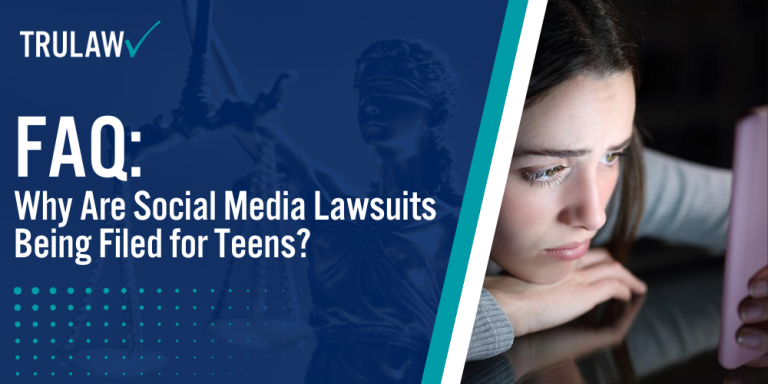
Intro to Social Media Lawsuits for Teens
On this page, we’ll discuss this issue in further depth, recent developments in Social Media Lawsuits, harmful effects of Social Media on youth mental health, who qualifies to file Social Media Lawsuits for teens and much more.
The primary allegations in these social media lawsuits claim that platforms such as Instagram, intentionally develop algorithms and visual filters that contribute to body dysmorphia and addiction.
Furthermore, there are accusations of data sharing about children under 13 without parental consent.
Table of Contents
Social Media Lawsuits for Teens
Recent legal developments have brought renewed attention to the issue of teen addiction to social media.
Several states have initiated legal action against major tech companies, such as Meta Platforms (formerly Facebook), alleging that these companies prioritize profits over the well-being of young users.
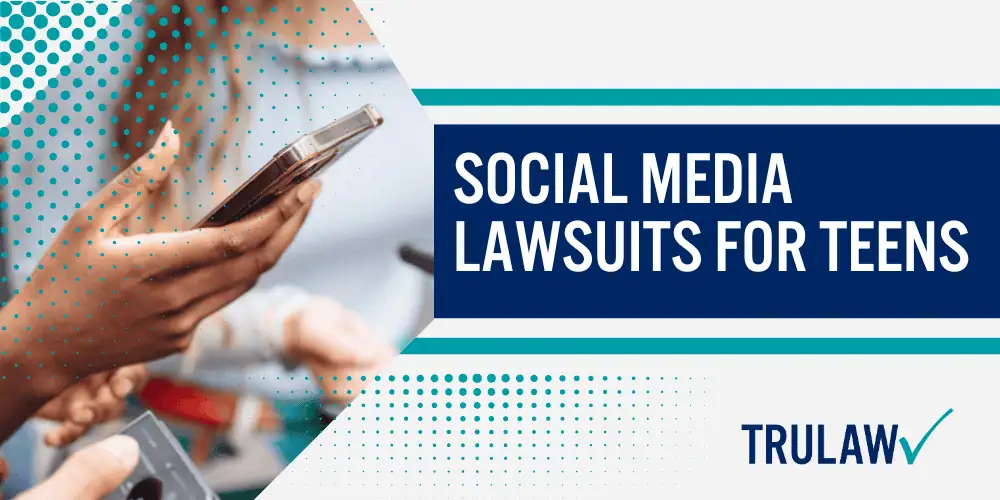
This focus is particularly on the designs and algorithms of their platforms.
Social Media Lawsuits: Teenage Addiction
The wave of lawsuits against Meta Platforms highlights a critical concern regarding the mental health of teenagers.
Key points in these lawsuits include:
- 41 U.S. States File Lawsuits: In a major legal move, 41 U.S. states have filed lawsuits against Meta, accusing the company of promoting social media addiction among teens.
- Internal Research Exposed: These actions follow revelations from internal research, previously highlighted by The Wall Street Journal, showing Meta’s awareness of the harmful impacts of its platforms on young users’ mental health.
- Claims of Intentional Addiction: The lawsuits argue that social media sites have developed products that intentionally hook young people, contributing to a youth mental health crisis. They allege that these platforms knew about the addictive nature of their services but chose profits over the welfare of vulnerable users.
These allegations point to a growing concern about the ethical responsibilities of social media companies and their impact on youth mental health.
Algorithms: The Core of Addiction and Profit
The role of algorithms in fostering addiction is a central theme in these lawsuits.
The key allegations in the social media lawsuits include:
- Increase profits at the expense of young adults’ mental health
- Promoting content leading to extended periods of use and addiction
- Adversely affecting the brain development of young users
This focus on algorithms underscores the need for greater transparency and accountability in how social media platforms operate and influence users, especially the younger demographic.
Legal Immunity Under Scrutiny
The legal immunity traditionally enjoyed by social media companies is now being questioned.
Significant aspects of the legal immunity under scrutiny includes:
- Section 230 of the Communications Decency Act: Traditionally, this law has protected social media companies from lawsuits related to user-posted content.
- Challenging Legal Immunity: The recent lawsuits challenge this immunity, focusing on the intentional design and algorithms that contribute to addiction and mental health issues among teens.
The outcome of these legal challenges could lead to significant changes in how social media platforms are regulated and held accountable for their content and design choices.
A Landmark Decision in Social Media Lawsuits for Teens
- Judge Rogers’ Decision: This landmark decision suggests that social media platforms might not be invulnerable if they intentionally design features known to be damaging.
- Pathway for Legal Action: This shift in legal perspective opens the way for individuals suffering from eating disorders, self-harm behavior, or suicidal thoughts linked to excessive platform use — and their families — to seek justice against influential social media companies.
This decision marks a potential turning point in the legal landscape, signaling a new era of accountability for social media companies and their impact on society.
Recent Developments in Social Media Lawsuits for teens
The landscape of current social media lawsuits has undergone a pivotal transformation with the establishment of a multi-district litigation (MDL) framework.
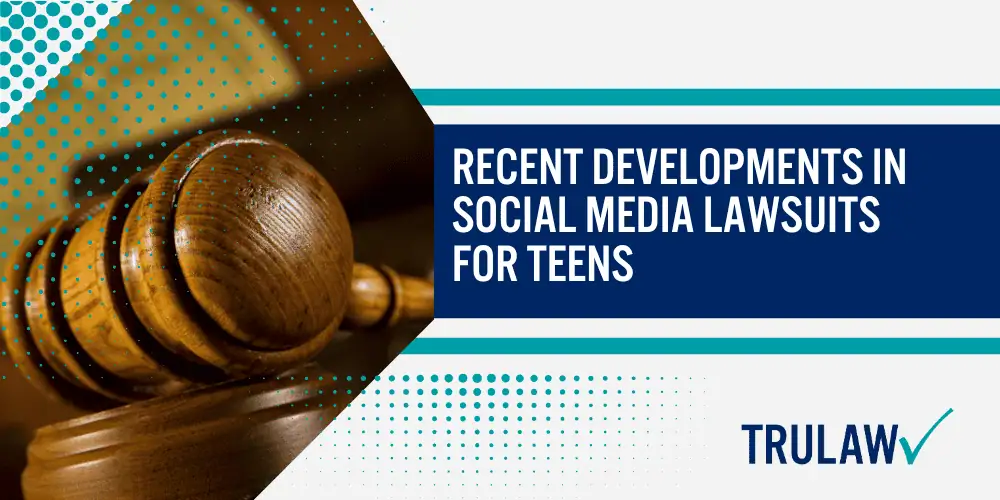
This development marks a significant escalation in the legal scrutiny of social media platforms, particularly in the context of addiction and its impact on young users.
Creation of Class Action MDL for Social Media Addiction Cases
A pivotal development in social media lawsuits is the formation of a Multidistrict Litigation (MDL) to address the increasing number of cases alleging social media addiction among teens.
This consolidation is a strategic move to:
- Streamline the legal process
- Ensure efficiency and uniformity in rulings.
- Provide a unified stance against major social media companies
These companies are accused of intentionally designing platforms that foster addictive behaviors in adolescents, contributing to mental health issues such as self-harm and suicidal ideation.
The MDL underscores the severity of allegations that social media platforms prioritize user engagement at the expense of the well-being of their younger users.
Plaintiffs argue that the algorithms employed by these platforms amplify content that heightens the risk of addiction and other psychological harms in vulnerable teens.
This development challenges the traditional legal immunity enjoyed by social media platforms, potentially setting a new precedent for accountability in the digital age.
Teens Targeted by Social Media Platforms
Social media platforms have become highly skilled at engaging teenage users.
Social media platforms have purposefully designed their algorithms to:
- Tracks online behaviors and purchases.
- Promote content that engages users for an extended period.
- Exploit the need for social acceptance and instant gratification.
The impact of these strategies is significant, with studies linking increased social media use to mental health issues in adolescents.
Teens often compare their lives to the idealized versions seen online, leading to anxiety, depression, and sometimes self-harm.
This exploitation of developmental vulnerabilities for profit has led to lawsuits against industry giants like Meta (formerly Facebook).
Vulnerability of Teens to Social Media Addiction
Teenagers are particularly susceptible to social media addiction.
While teenagers are developing decision-making and impulse control skills, they can be easily influenced by the addictive nature of social media.
The design of these social media platforms aims to exploit this with:
- Psychological triggers that make disengaging difficult.
- Features like notifications that create a sense of urgency.
- Personalized feeds that keep content fresh and engaging.
These dynamics have led to an increase in screen time among teens, heightening the risk of addiction and related mental health issues.
Social Media Companies Profiting from Teen Addiction
The business model of social media companies heavily relies on keeping users, particularly teens, engaged on their platforms.
This prolonged engagement translates into increased revenue streams from advertising and data collection.
The deliberate design of addictive features has led to a surge in litigation, with states and individuals accusing these companies of exploiting youth for financial gain.
The crux of these legal battles centers on the allegation that social media platforms intentionally create addictive features, contributing to mental health problems and other adverse outcomes in adolescents.
As evidence mounts regarding the detrimental effects of excessive social media use, including its links to teen suicide rates, the wave of social media addiction lawsuits is expected to grow, challenging the operational practices of these digital giants.
The Detrimental Effects of Social Media on Teen Mental Health
The digital age has brought with it a myriad of advancements and conveniences, but not without its share of challenges, particularly for adolescents.
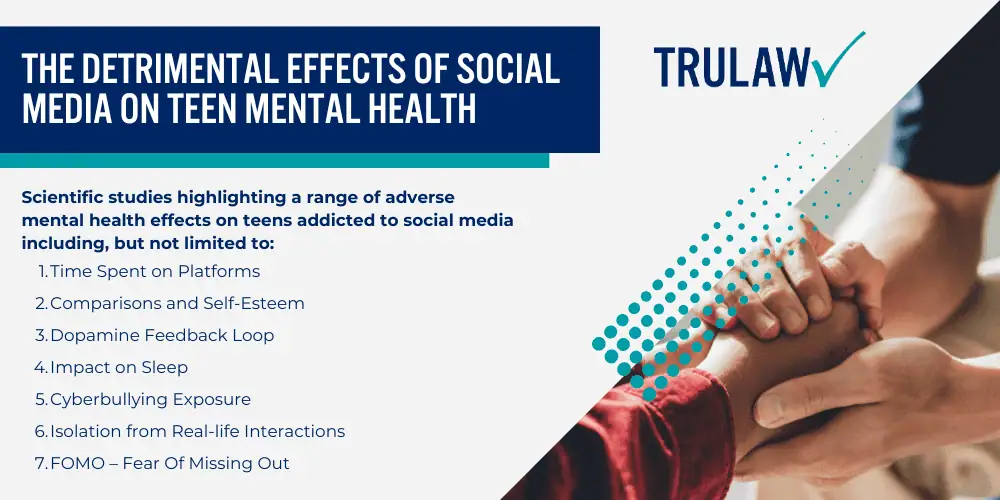
Scientific studies highlighting a range of adverse mental health effects on teens addicted to social media including, but not limited to:
- Time Spent on Platforms: Extended use of social media is closely linked with increased reports of mental health issues among adolescents. The constant engagement with these platforms is associated with heightened levels of anxiety and depression.
- Comparisons and Self-Esteem: Social media platforms often thrust teens into a relentless comparison cycle, adversely affecting their self-esteem and body image. The struggle to meet the unrealistic standards set by peers and influencers can lead to significant psychological distress.
- Dopamine Feedback Loop: The interaction with social media, through likes, shares, and comments, triggers a dopamine release in the brain. This mechanism can lead to an addictive relationship with these platforms, akin to gambling or substance abuse.
- Impact on Sleep: The blue light from screens disrupts natural sleep cycles, leading to poor sleep quality. Additionally, late-night social media use keeps the mind active when it should be resting, further reducing sleep duration.
- Cyberbullying Exposure: Social media exposes teens to cyberbullying, a form of psychological trauma that can have profound and lasting effects on their mental health.
- Isolation from Real-life Interactions: Ironically, while social media aims to connect people, it can lead to isolation from real-world interactions, depriving teens of essential emotional development opportunities.
- FOMO – Fear Of Missing Out: Social media can induce a pervasive sense of FOMO, triggering feelings of exclusion and inadequacy as teens witness their peers engaging in activities or acquiring new possessions.
These detrimental effects demand a comprehensive approach involving parents, educators, health professionals, and legal experts to mitigate the negative impacts.
Cyberbullying, Sleep, and Physical Activity: Affecting Teen Mental Health
The intersection of social media use and adolescent mental health is a complex and multifaceted issue.
Aspects of teen mental health significantly influenced by social media platforms include, but are not limited to:
- Cyberbullying: The impact of cyberbullying on teens is significant, often leading to depression, anxiety, and a decline in self-esteem.
- Sleep Disruption: Teen sleep patterns are heavily affected by late-night social media use, leading to stress and fatigue.
- Reduced Physical Activity: The replacement of physical activity with screen time compounds mental health issues, as exercise is crucial for mood enhancement and overall health.
It necessitates a comprehensive approach involving parents, educators, health professionals, and legal experts to mitigate its negative impacts.
As we navigate this digital landscape, it is crucial to foster healthier social media habits among adolescents and address the legal implications of these platforms’ effects on young minds.
Legal Implications and Potential Settlements
In recent years, the legal landscape has been reshaped by a series of social media lawsuits against companies like Meta, with families seeking justice for the mental health impacts on teens.
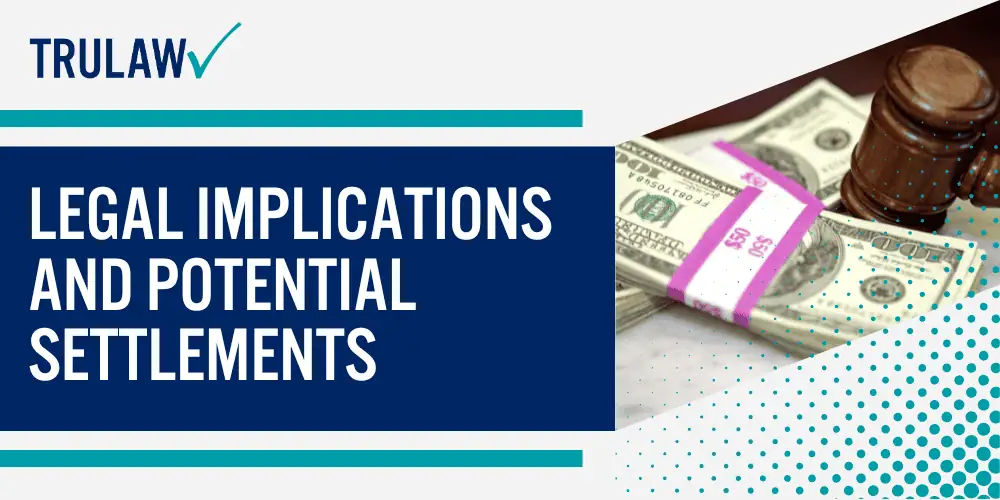
These cases are not just about financial settlements; they represent a broader struggle for accountability in the digital age.
Legal Challenges in Proving Harm
One of the primary challenges in these lawsuits is establishing a direct link between social media use and mental health issues.
Unlike physical injuries, psychological effects are more subjective and can vary widely among individuals.
Social Media Lawsuits: Potential Compensation
Lawyers need to demonstrate convincingly that prolonged exposure to social media has been detrimental to the well-being of teens, often relying on scientific studies to support their claims.
In addition to covering therapy costs and funding educational programs about the risks of social media, potential compensation could include:
- Long-Term Mental Health Support: Financial assistance for ongoing mental health care, including counseling and psychiatric services, especially for those with prolonged or severe psychological effects.
- Restitution for Lost Opportunities: Compensation for opportunities missed due to mental health issues attributed to social media use, such as educational setbacks or diminished career prospects.
- Funding for Research: Investment in scientific research to further understand the impact of social media on mental health and to develop more effective strategies for prevention and treatment.
- Public Awareness Campaigns: Support campaigns aimed at increasing public awareness about the potential negative effects of social media on mental health, particularly targeting young users and their families.
- Policy Change Initiatives: Financial backing for initiatives to change policies and regulations governing social media platforms, focusing on user safety, data privacy, and ethical design practices.
These potential forms of compensation reflect th impact of social media on mental health, aiming not only to provide immediate relief to affected families but also to instigate broader changes in the digital landscape.
The Broader Impact on Social Media Giants
These lawsuits are not just about individual cases; they represent a significant shift in how society views the responsibilities of social media companies.
Successful legal actions could set precedents, influencing future digital platform regulations and policies.
The ultimate goal is to create a safer online environment where the mental health of users, particularly vulnerable teens, is given precedence over corporate interests.
As this legal area continues to evolve, it’s crucial to stay informed about the latest developments and understand the implications for families and the broader digital community.
Empowering Parents and Holding Social Media Companies Accountable
By recognizing the symptoms of social media addiction and understanding the psychological impacts these platforms can have on teens, parents are more equipped to intervene effectively.
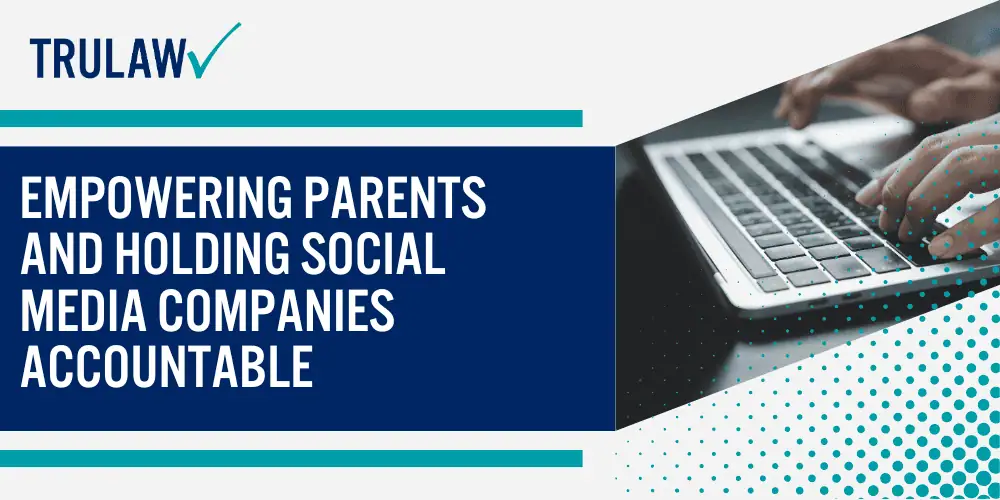
Protecting Children from Social Media Addiction
Parents have a crucial part to play in shielding their kids from the pitfalls of social media addiction.
Being aware and proactive, they can establish guidelines for use, keep an eye on online activities, and foster open conversations about digital well-being.
Parents need to recognize the signs of excessive use that may indicate addiction—changes in mood, sleep patterns, or even declining interest in other activities.
With lawsuits being filed against these companies for exploiting vulnerabilities in teens’ psychological development for profit, parents enforce boundaries not just at home but also within the industry itself.
The Social Media Victims Law Center
The Social Media Victims Law Center stands as a vanguard for families grappling with the repercussions of social media addiction.
With expertise in litigation against tech giants, this center provides legal support to victims seeking justice and compensation.
Their mission: empower parents and individuals by providing a pathway to confront those who have placed vulnerable youths in harm’s way for financial gain.
Pursuing social media lawsuits for addiction
Pursuing a social media addiction lawsuit requires understanding the legal landscape and assembling a strong case.
Critical steps in pursuing a social media addiction lawsuit against companies like Meta include:
- Collect Evidence: Document any signs of addiction, including time spent on social media, changes in behavior or well-being, and any professional mental health diagnoses or treatments received.
- Understand the Charges: Familiarize yourself with what companies like Meta are being accused of – specifically creating addictive features that harm teens’ mental health.
- Legal Framework Insight: Learn about how recent bipartisan actions by attorneys general help establish precedence for holding social media companies responsible for their platforms’ impact on young users.
- Impact Documentation: Compile a comprehensive record of how social media usage has affected your child’s life, such as educational setbacks, emotional distress, or other personal harms.
- Join Forces: Consider joining a multi-district litigation (MDL) if applicable, where cases around the country are grouped together due to similar allegations against social media entities.
- Seek Expert Opinions: Assessments from mental health professionals who support claims that social media use has had detrimental effects on your child’s psychological state.
- Prepare for Legal Challenges: Be ready to face arguments from social media companies claiming immunity under current laws or disputing their platform’s role in causing harm.
- Potential Settlements: Explore options regarding settlements that have been proposed or awarded in similar cases to gauge potential outcomes for compensation and remediation.
- Pursue Accountability: Push for not just financial compensation but also demand actions from these companies to make fundamental changes that protect teens from future harm.
If you are struggling with mental health issues due to social media use, it is important to seek help from a professional.
Contact TruLaw for a free consultation, or use the chat on this page for a free case evaluation to see if you qualify for potential legal action instantly.
Concluding Thoughts: Social Media Lawsuits
The escalation of social media lawsuits addresses the complex relationship between young users and digital platforms.
These lawsuits are not just legal challenges; they represent a growing societal concern about the impact of social media on the mental health and well-being of our youth.
Social Media Lawsuits: A Call for Accountability
Social media lawsuits have become increasingly prominent as tools for demanding accountability from platforms like Meta, which have significant influence over teen mental health.
These legal actions are pushing for a paradigm shift in how social media companies operate, urging them to prioritize the well-being of their younger users over profit margins.
Meta and the Spotlight of Social Media Lawsuits
Meta, in particular, finds itself at the center of these social media lawsuits, facing allegations that its platforms contribute to teen addiction and mental health issues.
These lawsuits challenge the company to reevaluate and redesign its algorithms and user engagement strategies, highlighting the need for a more ethical approach to social media.
Social Media Lawsuits: A Catalyst for Safer Online Spaces
The increasing number of social media lawsuits serves as a catalyst for creating safer online environments.
These legal battles are not just about seeking reparations; they are about driving systemic change within the social media industry to foster healthier digital spaces for all teens.
As social media lawsuits continue to unfold, they hold the potential to reshape the landscape of digital interaction for younger generations.
The hope is that these legal actions will lead to more responsible social media practices, ensuring that the digital world becomes a healthier, more nurturing space for teens to grow and thrive.
In conclusion, social media lawsuits are pivotal in the ongoing struggle to balance the benefits and risks of digital connectivity.
They are a crucial step towards securing a future where the mental health and well-being of our youth are not compromised by the very platforms designed to connect and engage them.
Social Media Harm Lawsuits Frequently Asked Questions
-
What are social media lawsuits for teens about?
Social media lawsuits for teens have been filed by multiple states, including California and New York, against Meta Platforms Inc.
They allege that the company was aware of the potential harm their platforms could cause but continued to develop addictive algorithms that lure young users.
If you are struggling with mental health issues due to social media use, it is important to seek help from a professional.
Contact TruLaw for a free consultation, or use the chat on this page for a free case evaluation to see if you qualify for potential legal action instantly.
-
Why are social media lawsuits being filed for teens?
Social media lawsuits are being filed for teens primarily due to the alleged harmful impact of social media platforms such as Instagram and Facebook (owned by Meta Platforms Inc.) on their mental health.
These platforms have been accused of deliberately designing addictive features, contributing to the youth mental health crisis.
The lawsuits seek financial damages, restitution, and an end to these harmful practices.
If you are struggling with mental health issues due to social media use, it is important to seek help from a professional.
Contact TruLaw for a free consultation, or use the chat on this page for a free case evaluation to see if you qualify for potential legal action instantly.
-
Who is filing the social media lawsuits?
Social media lawsuits are being filed by various entities for teens, including individual users, parents of teenagers, and even school districts.
There are also legal actions being taken by over 40 states against Meta due to alleged social media harm to children and teenagers.
Contact TruLaw for a free consultation, or use the chat on this page for a free case evaluation to see if you qualify for potential legal action instantly.
-
Who qualifies to file in the social media lawsuits for teens?
The eligibility criteria to file social media lawsuits for teens include, but are not limited to:
- Addiction to social media platforms, including Facebook, Instagram, TikTok, or Snapchat.
- Physical or mental harm suffered as a result of this addiction.
- The addiction began when the individual was under the age of 25.
If you are struggling with mental health issues due to social media use, it is important to seek help from a professional.
Contact TruLaw for a free consultation, or use the chat on this page for a free case evaluation to see if you qualify for potential legal action instantly.

Managing Attorney & Owner
With over 25 years of legal experience, Jessica Paluch-Hoerman is an Illinois lawyer, a CPA, and a mother of three. She spent the first decade of her career working as an international tax attorney at Deloitte.
In 2009, Jessie co-founded her own law firm with her husband – which has scaled to over 30 employees since its conception.
In 2016, Jessie founded TruLaw, which allows her to collaborate with attorneys and legal experts across the United States on a daily basis. This hypervaluable network of experts is what enables her to share the most reliable, accurate, and up-to-date legal information with our readers!
Additional Social Media Harm Lawsuits resources on our website:
Here, at TruLaw, we’re committed to helping victims get the justice they deserve.
Alongside our partner law firms, we have successfully collected over $3 Billion in verdicts and settlements on behalf of injured individuals.
Would you like our help?
At TruLaw, we fiercely combat corporations that endanger individuals’ well-being. If you’ve suffered injuries and believe these well-funded entities should be held accountable, we’re here for you.
With TruLaw, you gain access to successful and seasoned lawyers who maximize your chances of success. Our lawyers invest in you—they do not receive a dime until your lawsuit reaches a successful resolution!
AFFF Lawsuit claims are being filed against manufacturers of aqueous film-forming foam (AFFF), commonly used in firefighting.
Claims allege that companies such as 3M, DuPont, and Tyco Fire Products failed to adequately warn users about the potential dangers of AFFF exposure — including increased risks of various cancers and diseases.
Depo Provera Lawsuit claims are being filed by individuals who allege they developed meningioma (a type of brain tumor) after receiving Depo-Provera birth control injections.
A 2024 study found that women using Depo-Provera for at least 1 year are five times more likely to develop meningioma brain tumors compared to those not using the drug.
Suboxone Tooth Decay Lawsuit claims are being filed against Indivior, the manufacturer of Suboxone, a medication used to treat opioid addiction.
Claims allege that Indivior failed to adequately warn users about the potential dangers of severe tooth decay and dental injuries associated with Suboxone’s sublingual film version.
Social Media Harm Lawsuits are being filed against social media companies for allegedly causing mental health issues in children and teens.
Claims allege that companies like Meta, Google, ByteDance, and Snap designed addictive platforms that led to anxiety, depression, and other mental health issues without adequately warning users or parents.
Transvaginal Mesh Lawsuits are being filed against manufacturers of transvaginal mesh products used to treat pelvic organ prolapse (POP) and stress urinary incontinence (SUI).
Claims allege that companies like Ethicon, C.R. Bard, and Boston Scientific failed to adequately warn about potential dangers — including erosion, pain, and infection.
Bair Hugger Warming Blanket Lawsuits involve claims against 3M — alleging their surgical warming blankets caused severe infections and complications (particularly in hip and knee replacement surgeries).
Plaintiffs claim 3M failed to warn about potential risks — despite knowing about increased risk of deep joint infections since 2011.
Baby Formula NEC Lawsuit claims are being filed against manufacturers of cow’s milk-based baby formula products.
Claims allege that companies like Abbott Laboratories (Similac) and Mead Johnson & Company (Enfamil) failed to warn about the increased risk of necrotizing enterocolitis (NEC) in premature infants.
Here, at TruLaw, we’re committed to helping victims get the justice they deserve.
Alongside our partner law firms, we have successfully collected over $3 Billion in verdicts and settlements on behalf of injured individuals.
Would you like our help?
